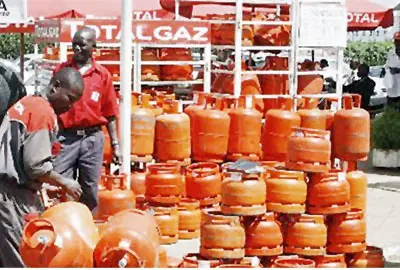News
Cooking Gas prices still soaring as Nigerians await promised drop

The cost of Liquefied Petroleum Gas (LPG), popularly known as cooking gas, has continued to soar across Lagos despite assurances from marketers that prices would soon fall back to between ₦950 and ₦1,000 per kilogram (kg).
A market visit to several gas outlets in Lagos revealed that prices remain between ₦1,200 and ₦1,400 per kg. At Gasland in Igando, Ikotun, and Mac Rich Gas Plant at Cele-Okota, the price stood at ₦1,200 per kg, while other vendors sold for as high as ₦1,400 depending on location.
Some gas dealers, who spoke anonymously, said, “Last month, we sold at ₦900 to ₦950 per kg, but now it’s ₦1,200 per kg. This is the reality in the country, but we hope prices drop soon.”
Investigations also showed that bulk retailers who purchase between 150kg and 200kg now pay ₦1,104 per kg.
Reacting to the sustained price increase, the outgoing President of the Nigerian Association of Liquefied Petroleum Gas Marketers (NALPGAM), Mr. Olatunbosun Oladapo, blamed it on a backlog of unsupplied products, maintenance issues, and refinery logistics. He, however, assured Nigerians that prices would normalize in the coming weeks.
Oladapo expressed confidence that the introduction of Seplat Energy gas into the market, coupled with increased production from the Dangote Refinery and other ongoing gas infrastructure projects, would ease supply shortages and stabilize prices nationwide.
Speaking at the association’s 38th Annual General Meeting, he highlighted a significant increase in Nigeria’s LPG consumption, which rose from 900,000 metric tonnes in 2021 to about 2 million metric tonnes in 2025.
“About four years ago, national consumption of LPG was between 900,000 and 1 million metric tonnes. Today, it has reached 2 million metric tonnes, and by the first quarter of next year, it will hit 3 million metric tonnes per annum,” Oladapo stated.
He attributed the growth to more investments, government collaboration, and the rising acceptance of gas as a preferred domestic energy source across the country.
-

 News1 day ago
News1 day agoFCT Polls: NUJ FCT seeks credible coverage, asks security agencies to protect journalists
-

 News2 days ago
News2 days agoBREAKING: Labour, Wike reach agreement as FCTA Workers resume duties
-

 National News1 day ago
National News1 day agoJUST IN: NECO releases 2025 External SSCE Results
-

 NUJ FCT1 day ago
NUJ FCT1 day agoBespoke Holdings MD Olatunji Visits NUJ FCT Council, pledges immediate support for Ultra Modern Congress Hall
-

 News1 day ago
News1 day agoNAPTIP cracks Human Trafficking ring in Onitsha, rescues 17 victims, Six arrested
-

 Entertainment2 days ago
Entertainment2 days agoSeyi Tinubu presents Obi Cubana with City Boy Movement appointment letter
-

 National News2 days ago
National News2 days agoFG raises alarm over rising diseases linked to Greenhouse Gas Emissions
-

 Metro1 day ago
Metro1 day agoAbia Police deny bomb recovery near Church in Aba

























